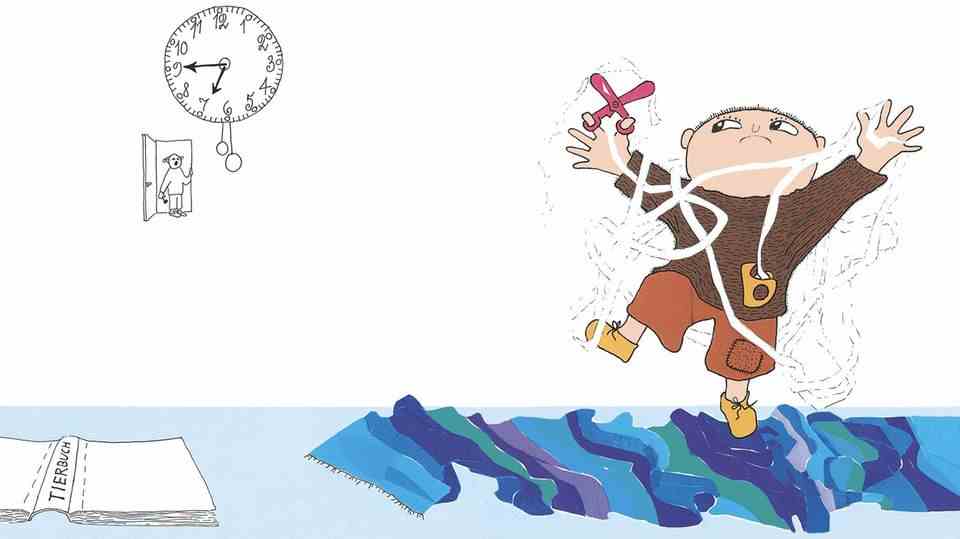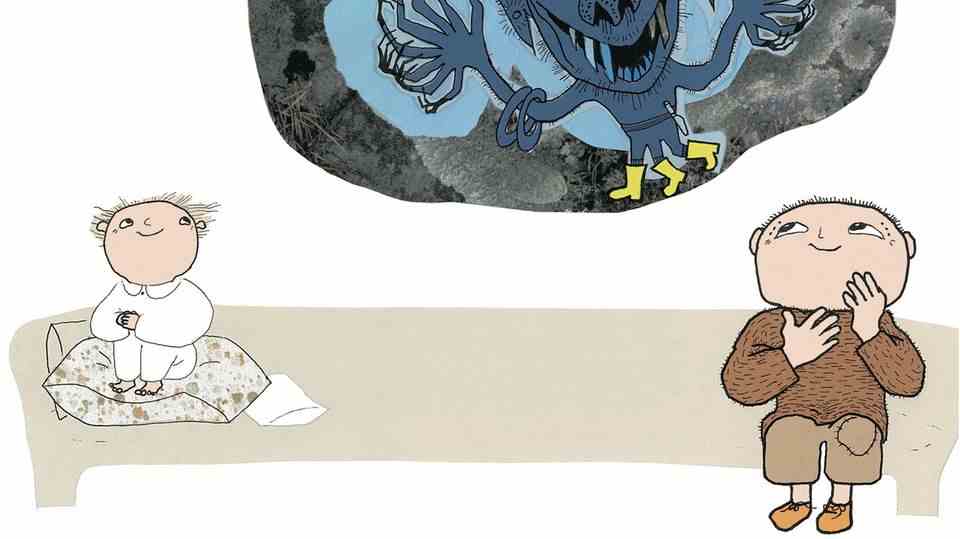Children’s book classic turns 50
A father with a child that booksellers found ugly – how Willi Wiberg came to Germany
Scene from “On Courage, Willi Wiberg”
© Gunilla Bergstrom
It’s hard to imagine bookshelves without Willi Wiberg. The boy from Sweden with his single father did not convince everyone in Germany at the beginning of the 1970s. The children’s book series turns 50 this year.
He looks very peevish, the little boy. Two tears roll down his large face, the buttons of his pajamas are undone. In the background, between the open curtains, the city glows in the glow of sunset. The wall clock reads 8:37 p.m. “This is Willi Wiberg, four years old. Sometimes he’s naughty and sometimes he’s nice. Tonight he’s naughty because he’s in a bad mood and doesn’t want to sleep.”
This is how the German audience got to know Willi Wiberg in 1974. At that time, “Gute Nacht, Willi Wiberg”, the first volume in the series from Sweden, was also published in German. Willi Wiberg was something special back then – for several reasons. On the one hand because of the aesthetics: the collage-like nature of the author and illustrator Gunilla Bergström, who passed away last summer, and the depiction of the little boy with the stubble hair have their own style. On the other hand because of the content: a small boy with a single father who lives in a high-rise building in the city. No great adventure stories, but ones that many children know from their everyday lives. From these aesthetic and content-related peculiarities, the third arises: that Willi Wiberg even exists.
Because Silke Weitendorf encountered resistance when she wanted to translate the stories by Alfons Åberg, as Willi Wiberg is called in the Swedish original, in the early 1970s. The senior publisher of the Oetinger publishing group still remembers this time well – and was ultimately responsible for Willi Wiberg coming to Germany.
Willi Wiberg grows up without a mother – the reason for this remains open
“I met Alfons Åberg at trade fairs in 1972 and 1973. I immediately liked the character. They are eye-to-eye stories that children can easily identify with. They also always end with a little punch line. The books are ideal for preschoolers “, says Weitendorf in conversation with the star. Willi is “a completely normal child” who can’t fall asleep at night, needs a friend to play with or is afraid of the first day of school. “His stories trigger many emotions that you can talk about with the children while reading them.”

Scene from “Hurry up, Willi Wiberg”
© Gunilla Bergstrom
So Weitendorf was enthusiastic about these stories early on. But that wasn’t the case for everyone. “Some found the child with the bollhead ugly. The collage-like illustrations were also new for the time and didn’t always appeal to everyone right away. Some booksellers thought that only beautiful books would sell and that Willi Wiberg wasn’t beautiful. Also that Willi didn’t have a mother and growing up with his father was still irritating at the time. The author deliberately left the reason open.”

Scene from “More Monsters, Willi Wiberg!”
© Gunilla Bergstrom
The group of supporters finally prevailed. “Gute Nacht, Willi Wiberg”, published in 1974, has sold 151,000 copies and is still the most successful single volume in the series. According to Weitendorf, Willi Wiberg is not a bestseller, but a long seller, and the volumes have a loyal fan base. On the occasion of 50 years of Willi Wiberg, a new anthology with five stories will be published in August.
One of Sweden’s most popular children’s book characters
In his native Sweden, Alfons Åberg is one of the most popular children’s book characters. “Maybe because Alfons is not a superhero and not a cute fairy tale character either, because he is not big and strong and prefers to avoid fights,” says Grit Thunemann from the Swedish Embassy in Berlin. On the occasion of Willi Wiberg’s 50th birthday – the first volume was published in Sweden in 1972 – she coordinated a day with specialist lectures and discussions on Willi Wiberg in the Felleshus of the Nordic Embassies in Berlin. “Reality is fairytale enough,” Gunilla Bergström said of Alfons Åberg’s stories. Certainly contributing to the popularity of Alfons is that the stories are filmed and staged in Sweden, that there is music, exhibitions, Alfons puzzles and puppets. “And the children from back then rediscover their friend Alfons today with their children and grandchildren.”
The children of that time in Sweden were already growing up in a modern society. This is also expressed in Willi Wiberg: the family model, the long opening hours in the kindergarten, life in the big city. In Sweden in the 1970s it was normal for single fathers to exist, says Silke Weitendorf. “When I sat in meetings with colleagues from Sweden in the 90s, it often happened that they had to leave earlier to pick up their child from daycare, kindergarten or school.” In Germany that was still the big exception at the time.
How Alfons became Willi
While Alfons has his fans in Sweden, it is Willi in Germany. “Maybe we would have left it with the name Alfons Åberg today. Nowadays there is a tendency not to Germanize names so that there are no problems if, for example, a film is released to accompany the book and the character bears the original name there,” says Weitendorf. At that time, however, a change was clear to her, because the Swedish “Å” is pronounced like “O”; “Oberg” or “Aberg” would have seemed wrong to them.
“At the time, I found Willi a smart name that suited the little guy. The surname should of course start with the same letter in alliterary terms. The fact that I finally came up with Wiberg was perhaps due to the fact that the illustrator Harald Wiberg, who drew the Tomte picture books has been known to us since the 1960s. I think that’s how I came across Willi Wiberg.” However, Alfons also appears in the German translation: as Willis’ invisible friend. Of course, as a child without superpowers, Willi also had it.



